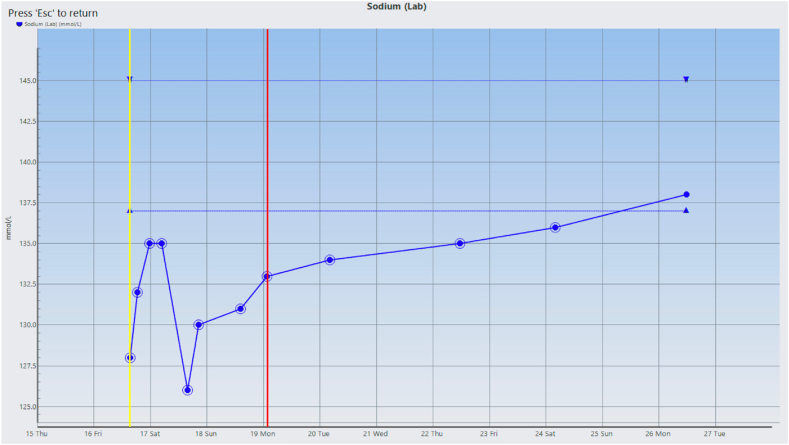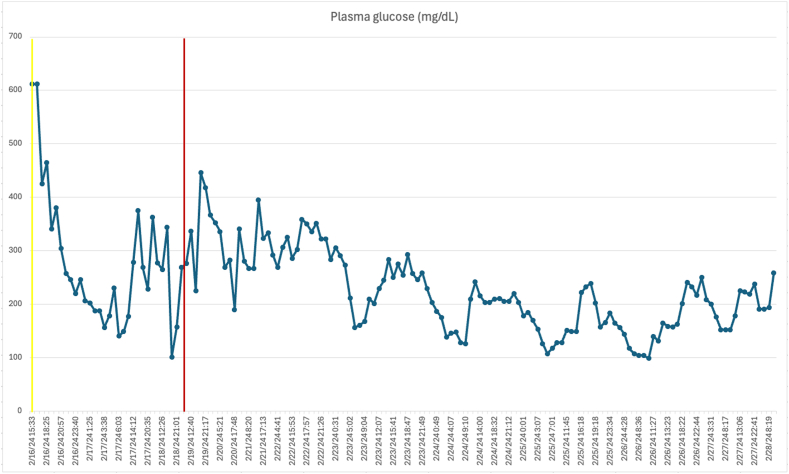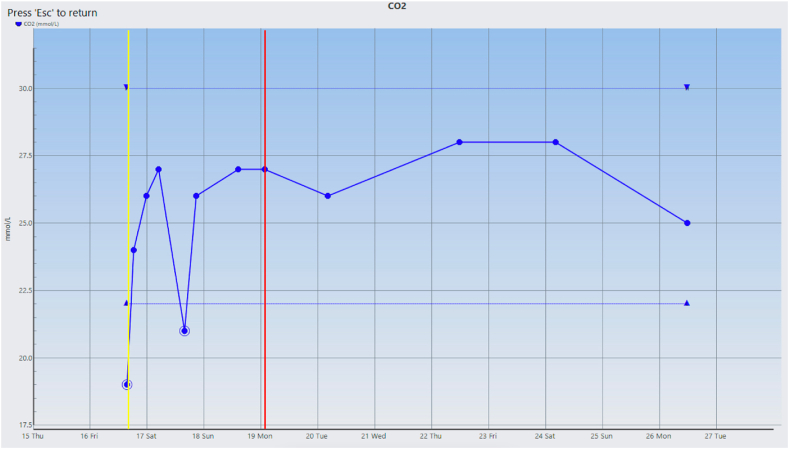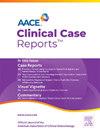Alpelisib-Induced Diabetic Ketoacidosis and Insulin-Resistant Hyperglycemia
IF 1.2
Q3 Medicine
引用次数: 0
Abstract
Background/Objective
Alpelisib is a phosphatidylinositol 3-kinase inhibitor used to treat certain hormone therapy resistant breast cancers that can cause hyperglycemia through inhibition of the insulin signaling cascade. Diabetic ketoacidosis with the initiation of alpelisib remains a rare complication. The objective of this report is to describe a patient with alpelisib-induced diabetic ketoacidosis and the difficulties of management.
Case Report
A 59-year-old woman was admitted to the hospital with a history of noninsulin dependent type 2 diabetes on metformin presented with diabetic ketoacidosis. One month prior to this hospitalization, the patient was started on alpelisib. On presentation, blood glucose level was 612 mg/dL and hemoglobin A1c level was 11.9% (107 mmol/mol), a 4.6% (27 mmol/mol) increase from 2 months prior. The patient was started on intravenous insulin and alpelisib was held resulting in rapid resolution of the patient’s hyperglycemia and ketoacidosis. However, with reinitiation of alpelisib the patient developed worsening hyperglycemia. Relative glycemic control was ultimately obtained with 3 oral agents and high doses of insulin.
Discussion
Direct inhibition of insulin signaling by alpelisib leads to insulin-resistant hyperglycemia. Most cases can be controlled with oral agents; however, insulin therapy is required in rare instances. Although more effective for glycemic control, insulin therapy has the potential to decrease the antitumor effects of alpelisib.
Conclusion
Diabetic ketoacidosis is a rare complication of alpelisib initiation, which is quickly resolved with cessation of the agent. For patients where cessation is not an option, insulin and insulin sensitizing agents can be used to achieve glycemic control at the potential detriment of tumor treatment.



alpelisib诱导的糖尿病酮症酸中毒和胰岛素抵抗性高血糖。
背景/目的:Alpelisib是一种磷脂酰肌醇3激酶抑制剂,用于治疗某些激素治疗抵抗性乳腺癌,这些乳腺癌可通过抑制胰岛素信号级联引起高血糖。糖尿病酮症酸中毒的起始alpelisib仍然是一个罕见的并发症。本报告的目的是描述一个病人与alpelisib诱导的糖尿病酮症酸中毒和管理的困难。病例报告:一名59岁的女性因二甲双胍非胰岛素依赖型2型糖尿病病史入院,并表现为糖尿病酮症酸中毒。在此住院治疗前一个月,患者开始使用alpelisib。入院时,血糖水平为612 mg/dL,血红蛋白A1c水平为11.9% (107 mmol/mol),比2个月前增加4.6% (27 mmol/mol)。患者开始静脉注射胰岛素,并给予alpelisib,导致患者的高血糖和酮症酸中毒迅速消退。然而,随着alpelisib的重新开始,患者出现了恶化的高血糖。3种口服药物和高剂量胰岛素最终获得相对血糖控制。讨论:alpelisib直接抑制胰岛素信号传导导致胰岛素抵抗性高血糖。大多数病例可通过口服药物加以控制;然而,在极少数情况下需要胰岛素治疗。虽然胰岛素治疗对血糖控制更有效,但有可能降低alpelisib的抗肿瘤作用。结论:糖尿病酮症酸中毒是一种罕见的并发症,停药后可迅速解决。对于无法戒烟的患者,可以使用胰岛素和胰岛素增敏剂来实现血糖控制,但可能会损害肿瘤治疗。
本文章由计算机程序翻译,如有差异,请以英文原文为准。
求助全文
约1分钟内获得全文
求助全文
来源期刊

AACE Clinical Case Reports
Medicine-Endocrinology, Diabetes and Metabolism
CiteScore
2.30
自引率
0.00%
发文量
61
审稿时长
55 days
 求助内容:
求助内容: 应助结果提醒方式:
应助结果提醒方式:


